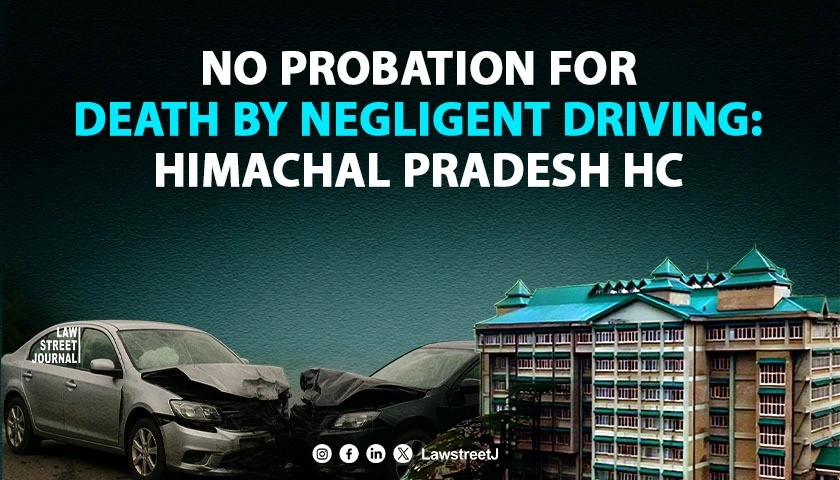Himachal: The Himachal Pradesh High Court has delivered a significant judgment reaffirming that the benefit of the Probation of Offenders Act, 1958 cannot be granted to those convicted of causing death by rash and negligent driving under Section 304A of the Indian Penal Code, emphasizing the need for deterrent sentencing in motor accident cases.
Justice Virender Singh allowed an appeal filed by the State of Himachal Pradesh against an order of the Additional Sessions Judge that had released the accused on probation despite her conviction for causing death by negligent driving.
The court noted that the respondent, Rajika Gupta, had been convicted by the trial court under Sections 279, 337, and 304A IPC and sentenced to two years’ simple imprisonment along with fines. However, the Appellate Court modified the sentence by releasing her on probation under Section 3 of the Probation of Offenders Act with conditions including payment of ₹50,000 compensation and free medical services.
Rejecting the benefit of probation in such cases, the court extensively relied on the Supreme Court’s landmark judgment in Dalbir Singh v. State of Haryana, reproducing key observations:
“Bearing in mind the galloping trend in road accidents in India and the devastating consequences visiting the victims and their families, criminal courts cannot treat the nature of the offence under Section 304A of IPC as attracting the benevolent provisions of Section 4 of the P.O. Act.”
The court emphasized the Supreme Court’s directive on deterrent sentencing, quoting:
“While considering the quantum of sentence to be imposed for the offence of causing death by rash or negligent driving of automobiles, one of the prime considerations should be deterrence… He must always keep in mind the fear psyche that if he is convicted of the offence for causing death of a human being due to his callous driving of a vehicle, he cannot escape from jail sentence.”
Justice Singh reinforced this principle by citing the Supreme Court’s subsequent judgment in State of Punjab v. Balwinder Singh, which held:
“It is settled law that sentencing must have a policy of correction… Considering the increased number of road accidents, this Court, on several occasions, has reminded the criminal courts dealing with offences relating to motor accidents that they cannot treat the nature of the offence under Section 304A IPC as attracting the benevolent provisions of Section 4 of the Probation of Offenders Act, 1958.”
When the respondent’s counsel relied on the Supreme Court’s decision in Paul George v. State of N.C.T. of Delhi where probation was granted, the court distinguished it by noting that “the Hon’ble Supreme Court has released the convict on probation considering the peculiar facts and circumstances of the case.” The court further clarified that such exceptional cases cannot be treated as binding precedents for general application.
The court emphasized the doctrine of binding precedent, citing National Insurance Company Limited v. Pranay Sethi, which established that “an earlier decision may seem to be incorrect to a Bench of a coordinate jurisdiction considering the question later… yet it will have the binding effect on the later Bench of coordinate jurisdiction.”
Concluding its analysis, Justice Singh categorically stated:
“It has constantly been held by the Hon’ble Supreme Court that the benefit of the provisions of the Probation of Offenders Act should not be given to a person convicted for the offence of causing death due to rash and negligent driving.”
The court also noted that “the learned Appellate Court has given reasons for releasing the accused on probation, which are outside the scope of Sections 3 and 4 of the Probation of Offenders Act.”
However, recognizing the accused’s right to have her appeal decided on merits rather than being dismissed merely on her statement of not pressing the conviction appeal, the court observed:
“The valuable right of the accused to get her appeal decided on merits cannot be snatched away. The accused has every right to a decision on the merits of her appeal.”
Accordingly, the court set aside the Appellate Court’s judgment modifying the sentence and remanded the matter back to the trial court to decide the appeal against both conviction and sentence afresh after securing the accused’s presence.
CASE TITLE: State of H.P. v. Rajika Gupta [Cr. Appeal No.132 of 2025]
APPEARANCES: Mr. Tejasvi Sharma, Additional Advocate General appeared for the Appellant, whereas Mr. N.K. Thakur, Senior Advocate along with Mr. Karanveer Singh, Advocate appeared for the Respondent.



![Himachal HC Grants Bail to Man Accused of Unnatural Acts with Cow [READ ORDER]](/secure/uploads/2020/11/lj_8855_Himachal_Pradesh_High_Court.jpeg)
![Remaining in India after expiry of visa is offence, Himachal Pradesh HC reiterates while denying bail [Read Petition]](/secure/uploads/2023/12/lj_3841_e40384f4-2611-4a51-b179-97824c5e53c7.jpg)

![Supreme Court Stays Himachal Pradesh HC Order, Sanjay Kundu to Remain as State DGP Amid Businessman's Complaint [Read Order]](/secure/uploads/2024/01/lj_5499_5a926c6d-aa3b-4344-b54d-2c7fc5145ace.jpg)




